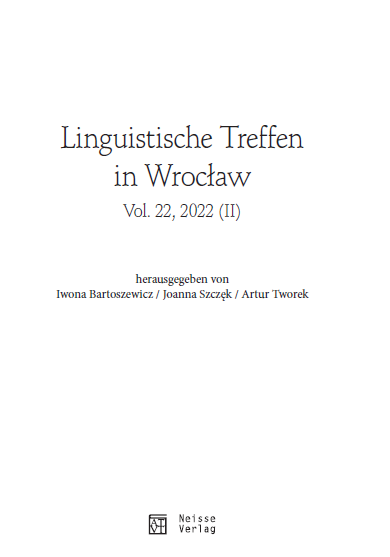Kommunikativ-pragmatische Determiniertheit des internationalen Dokuments „Charta“ (am Beispiel der Europäischen Charta der Regional oder Minderheitensprachen)
Communicative-Pragmatic Determination of the International Document “Charter” (Using the Example of the European Charter for Regional or Minority Languages)
Author(s): Svitlana IvanenkoSubject(s): Pragmatics, Theory of Communication
Published by: Oficyna Wydawnicza ATUT – Wrocławskie Wydawnictwo Oświatowe
Keywords: charter; communicative-pragmatic; factual prose; document; text subtype;
Summary/Abstract: The traditional interpretation of the term “non-fiction/official” includes a number of features that are often mandatory for their texts. In modern linguistics the non-fiction/official prose is interpreted differently, which can be traced back to the analysis of the research objects under new aspects. As a result of this process, we can observe that theoretical terms have lost their definitional precision and that their boundaries are often fluid. In the present article the attempt is made to show the relativity of constraint features for non-fiction/official prose using the example of the international document “Charter”, which is characterized from a communicative-pragmatic point of view. In doing so, the peculiarities of pragmatic strategies and tactics of a collective author are taken into account and their use of language in relation to a collective recipient is worked out. The analysis of the communication situation, inherent to a Charter, which typifies the characteristics of the text subtype “Charter”, has pointed out the relativity of characteristics and confirmed it. As an international document, the Charter has the characteristics of a law addressed to professionals as well as to the broad mass of the population. The peculiarity of the European Charter for Regional or Minority Languages consists in the possibility of choosing the appropriate clause for the activities of the state and municipal organs according to the language-political situation on site, which the Charter as a legal sub-type of the documents “de lege ferenda” with less mandatory Forms character. This feature of the charter has a particularly strong impact on its third part, demonstrating the influence of the pragmatic communication goal on the modification of the text type form in its linguistic form.
Journal: Linguistische Treffen in Wrocław
- Issue Year: 22/2022
- Issue No: 2
- Page Range: 45-58
- Page Count: 14
- Language: German

